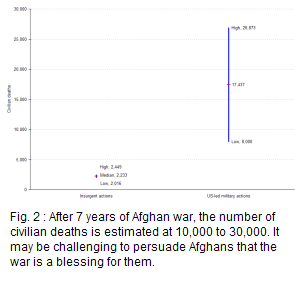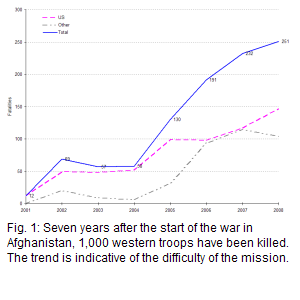
|
Insight : Afghan war |

|
|
You are here: areppim > Society > Afghan war
Already 7 years of war in Afghanistan
"The US has broken the second rule of war. That is, don't go fighting with your land army on the mainland of Asia. Rule one is don't march on Moscow."
[Field Marshal B. L. Montgomery, quoted in 'Montgomery of Alamein' by Alun Chalfont, New York, Atheneum, 1976]


On 7 October 2008, the war in Afghanistan has been raging for 7 years. After initial success, the so called "Operation Enduring Freedom" (OEF) and the companion Nato ISAF (International security assistance force) armies are facing escalating difficulties.
The number of acknowledged coalition fatalities is increasing every day totalling 1,000 troop deaths on 24 October 2008 (see enlarged Fig.1 chart); daily fatalities of coalition troops are now more numerous than in Iraq. Numbers of wounded are not rendered public. Civilian deaths are not officially reported or validated but are estimated to a cumulative 10,000 to 30,000 since 2001 (see enlarged Fig.2 chart). This seems intolerable in the context of a mission supposed to endeavour for the people's good. The amount of territory effectively controlled by the government and ISAF is steadily shrinking. The conflict tends to spread to neighbouring countries and take a regional scope. Meanwhile, all coalition members moan and grumble about the unaffordable costs of the war, and the weight of their individual share of the burden. Whining is understandable, considering that the cost of the operation adds up to $171.7 billion, cumulative 2001 to 2009 budget bridge, for the US alone.
History may not repeat itself, nevertheless it seems that the success of foreign interventions in Afghanistan is anything but enduring.
- Alexander the Great (330 to 327 B.C.) had to fight hard to submit the rebellious satraps of the area where Afghanistan is located. The battle of Polytimetos was such a nasty disaster that the great man threatened with death penalty those survivors who dared report the truth. Eventually, the exhaustion of the army led him to downsize his dreams of conquest and walk back to his capital city in Babylon.
- In the 19th century, in the midst of the "Great Game" between the Russian and the British empires, the indomitable British forces had equally horrid encounters with Afghans. The 1st Anglo Afghan war (1839-1842) ended with a disastrous mass retreat from Kabul, whose sole survivor, Dr. Brydon, became a heroic legend. Obviously, England retaliated, but left Kabul to Afghans after this face saving gesture.
- During the 2nd Anglo Afghan war (1878-1881) the British, engaged in a "forward policy" race with Russia, sent a force under General Burrow's leadership to Afghanistan. It suffered a humiliating total defeat and dispersion. Again, some retribution followed, but Kabul was left alone once more.
- The 20th century registered two further episodes. The first was the 3rd Anglo Afghan war (1919), motivated by the will to create a buffer to protect India from the new Soviet power inaugurated by the 1917 communist revolution. Instead, it ended up with an independent Afghan state, and everybody went back home.
- The second was the recent Soviet Afghan war (1979-1989). It was Soviets' turn to try and establish a buffer state to protect themselves from US progress in Middle East, Persian Gulf and Pakistan, perceived in Moscow as an encirclement threat. It ended with the collapse and withdrawal of the Soviet army, followed by civil war and the emergence of the Taliban power.
The current prospects of the Nato powers look very much like an additional chapter of the same story book. Many western analysts, including top ranking military and diplomats, are saying aloud that victory is moving out of reach as days unfold. Some say that the issue is essentially a military one, and the war can still be won, provided forces are duly upgraded and Afghan neighbours play ball. Others object that a sheer military victory is doubtful, and a political solution must be implemented, encompassing military power, but also diplomacy and "winning the hearts and minds" of the Afghan populace. Then there are those who contend that a victory – military or otherwise – is a daydream, the only option available being to cut losses and come to an arrangement with the Taliban.
Reports tend to confirm the idea that a less bellicose and more pragmatic scheming is in the making:
- Military presence may still be reinforced.
- Simultaneously, Afghan authorities are sending feelers to insurgents to test their willingness to talk.
- Allegedly, Saudi rulers have hosted a meeting between Afghanistan government members, Taliban leaders and Pakistani envoys in September 2008.
Time for western rulers to mind the old lesson exposed in such succinct terms by Montgomery.
- Sources of data:
- (i) Military deaths : iCasualties.org: Operation Enduring Freedom;
- (ii) Civilian fatalities : http://en.wikipedia.org/wiki/Civilian_casualties_of_the_War_in_Afghanistan_(2001%E2%80%93present), and sources listed therein.
- (iii) Cost of Afghan war : 'The Cost of Iraq, Afghanistan, and Other Global War on Terror Operations Since 9/11', CRS (Congressional research service) Report for Congress, Updated July 14, 2008, Order Code RL33110.
- Background information : (i) Hopkirk, P. 'The Great Game'. Oxford University Press, Oxford, 1990. (ii) United Nations Assistance Mission in Afghanistan (UNAMA), http://www.unama-afg.org/; Reuters AlertNet, http://www.alertnet.org/; OpenDemocracy, http://www.opendemocracy.net/.]
Download


 Go toTop
Go toTop
 Home
Home